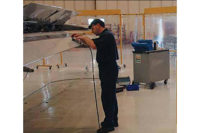When people board an airplane, they bring with them the need for wireless data. This need, according to technology experts, is quite extensive: Trillions of megabytes of data annually for millions of continuous inflight calls, texts, chats, games and video conferences. Aviation communications provider SmartSky Networks LLC (SSN) is helping airlines meet this challenge through its 4G air-to-ground communications network.
Scheduled for completion later this summer, the 60-megahertz-band network is designed to provide data at more than 10 times the typical speed and capacity of current cell tower networks. Other benefits for commercial airplanes include flight path optimization, fuel savings, engine and airframe monitoring, analytics and predictive maintenance, and continuous high-definition mapping of weather patterns and turbulence.
The network consists of three massive datacenters and a nationwide array of 250 cell towers. Datapipe and Equinix operate the data centers in California, Colorado and Virginia. Crown Castle, SBA and American Tower own the cell towers.
Since 2014, SSN has built proprietary antennas and ground stations, deployed them on individual towers, and tested each antenna’s and station’s effectiveness at providing data to passengers in various models of aircraft. The company often uses a custom twin-engine, turbo-prop Beechcraft B200 King Air test platform to simulate the inflight capabilities of several airplanes.
From the outside, the B200 looks like a standard small plane that can carry a dozen passengers. Inside, however, it is equipped with instruments and several GORE 7 Series microwave-radio frequency cable assemblies made by W. L. Gore & Associates Inc. Engineers there quickly designed and provided the assemblies to help SSN stay on its testing schedule.
“Performance, ease of installation, and reliability of the coaxial cables used in the 4G are all important factors to ensure a lifetime of customer satisfaction in a modern connectivity solution,” explains Darren Emery, vice president of product support at SSN. “The team at Gore provided us with a set of high-quality cables in a very short timeframe. We look forward to the benefits we’ll see over the life of the aircraft as we test and deploy the network.”
According to Emery, SSN chose the 7 Series primarily because its small diameter, high flexibility and tight bend radius enable harness installers to perform complex routing within the tight confines of the test aircraft. In addition, the assembly’s low-profile replaceable connectors allowed for quick configuration changes during the building of the platform.
All 7 Series assemblies are vapor-sealed to prevent the ingress of water vapor, fuel and other hazardous contaminants commonly found in airborne environments. They maintain low insertion and return loss, while shielding against electromagnetic interference that can compromise signal integrity over long distances and reduce signal transmission quality. The assemblies also meet the mechanical and environmental requirements for airframe cables defined in the MIL-T-81490 specification.
Gore produces other types of cables, including those for high-speed data transmission, and power and signal delivery. These cables are used in civil and military aircraft, clean rooms, and oil and gas operations. For more information on cable assemblies, call 302-738-4880 or visit www.gore.com.



